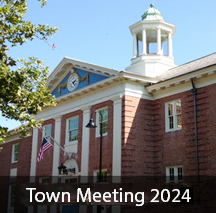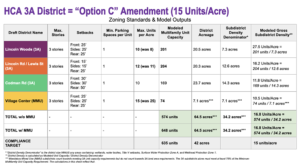 At one of the longest and most controversial Town Meetings in recent history, voters on March 23 narrowly approved the Housing Choice Act zoning amendments by a margin of 52% to 48%. The community center funding measure, which needed a two-thirds majority, was approved easily.
At one of the longest and most controversial Town Meetings in recent history, voters on March 23 narrowly approved the Housing Choice Act zoning amendments by a margin of 52% to 48%. The community center funding measure, which needed a two-thirds majority, was approved easily.
Knowing that the meeting would be heavily attended, town officials had plenty of extra volunteers on hand to check in residents starting at 8 a.m. for the 9:30 meeting, and to count standing votes. Both the Todd Auditorium/Lecture Hall and the Reed Gym were at full capacity, with even more people in the Learning Commons. Before the meeting could start, town counsel Joel Bard had to be escorted in by police after he got stuck in the traffic jam of cars trying to park on campus, and an unknown number of residents were reportedly turned away by police and advised to park at Town Hall or Donelan’s. Some braved the walk in heavy rain and others didn’t.
The rezoning issue, already the topic of hot debate for the last several months, started Saturday with a bombshell right off the bat when Michele Barnes of the Rural Land Foundation introduced an amendment from the floor that was intended to address concerns that housing density at the mall would be too high under the revised bylaw. Their proposed changes to the bylaw wording endorsed by the Planning Board on February 26 by a 3-2 vote:
- Reduce the maximum housing density in the village center subdistrict that includes the mall from 25 units per acre to 15.
- To compensate, increase the maximum density of the Lincoln Woods subdistrict from eight to 10 units per acre, and the Lincoln Road/Lewis Street subdistrict from 11 to 12.
- Strike the section (12.9.2.3.a.10) that would allow the Planning Board to reduce the required percentage of commercial use at the mall from 33 percent by special permit if that ratio were shown to be incompatible with “economic and market conditions.”
The amendment thus made “33 percent commercial” an inviolable minimum unless residents approve a further change in zoning language at a future Town Meeting.
 The proposal was first discussed publicly at a Housing Choice Act Working Group on the morning of March 14. At that meeting, Director of Planning and Land Use Paula Vaughn-MacKenzie told the group that Ephraim Flint and Lynn DeLisi, the Planning Board members who cast the two “nay” votes on February 26, were planning to introduce the amendment on the floor of Town Meeting.
The proposal was first discussed publicly at a Housing Choice Act Working Group on the morning of March 14. At that meeting, Director of Planning and Land Use Paula Vaughn-MacKenzie told the group that Ephraim Flint and Lynn DeLisi, the Planning Board members who cast the two “nay” votes on February 26, were planning to introduce the amendment on the floor of Town Meeting.
“In anticipation of a possible amendment,” planning consultant Utile was asked to “develop two alternatives” that would meet the state’s HCA requirements, and the bylaw with Saturday’s amendment passed muster, Planning Board Chair Margaret Olson said.
Many unhappy with last-minute amendment
“This is just off-the-charts bizarre,” said Bob Domnitz. “In the 15 years I was on the Planning Board, we always recommended that zoning not be created on the floor of Town Meeting.” The changes should have been incorporated before the February 20 public hearing, he added, “and I think it’s further evidence that the main motion and amendment are not ready for this town.”
“There’s no way I can really understand and vote intelligently and with full knowledge of what this means,” another resident said.
Although the amendment was reportedly devised by DeLisi and Flint, they did not present a united front in the discussion. “I’m very happy to see that Michelle brought this forth,” said DeLisi. “I love this amendment — I think it’s a great compromise.” Flint was less sanguine. “What I’ve heard this morning is for the most part a very positive step forward… but I agree with Bob that we are not going to get this right on the floor of the meeting,” he said.
The amendment “is not a major change” for the Lincoln Woods and Lincoln Road subdistricts and it “addresses people’s greatest concerns” about commercial space at the mall, said Jonathan Soo, a leader of a citizens’ group pushing for passage. “We can’t delay the healing that this town desperately needs,” he said.
“Settling the matter now is far preferable to another nine months of arguing about what to do,” agreed Alex Chatfield.
Desire for closure prevails
On Saturday, voters approved the amendment by a vote of 603-216 (74% to 26%), clearing the required two-thirds majority. But more impassioned discussion of the main motion followed.
Speakers protested that the HCAWG did not include any members who live in the subdistricts targeted for rezoning (although the group was appointed before any specific parcels had been identified), and that Flint and DeLisi were denied permission on March 20 by Town Moderator Sarah Cannon Holden to speak from the podium and use slides. Olson did, however, read the letter that the pair submitted to their fellow Planning Board members on February 26.
“The process has not provided a fair and balanced view of this controversial topic,” Sherry Haydock said. “Voting no is a chance for all voices to be heard… with equal representation and inclusivity,” she said to loud cheering.
But others said that defeating the measure vote would do far more harm than good. Referring to an earlier comment that the town is in crisis and needs “family therapy,” HCAWG member Terri Perlmutter said, “the notion that as a family we’ll come together where everyone suddenly agrees is naive. Family therapy takes years and mayne 50 percent of the time it’s successful. I would remind people to not let the perfect be the enemy of the good.”
“There’s no way to know if that process would be less divisive or more divisive, or produce a compromise with more support or less support,” Soo said. Town officials, staff, and volunteers have borne the brunt of the battle, he added, “and they won’t say it publicly, but I will — they have been treated absolutely horribly. We cannot go forward and subject them and the rest of the town to another nine months of this on the mere wish that we might be able to come up with something better. Voting no would have a real cost to our town… and that makes me worry much more for Lincoln’s future than any zoning law.”
Bombshell?! I saw it as more of a big olive branch. I am grateful to the RLF and others that came up with this amendment. It was a great way to compromise at town meeting and I think it did help many feel more comfortable in voting yes. Thank you, Staci Montori
What the article fails to disclose is the financial interest of Mr. Soo. His parcel is being rezoned, is in a prime location and will likely see a sharp increase in value now. This should have been disclosed in the article and he should have disclosed when speaking at town meeting as is required by law.
Not sure how this by law does not apply to Lincoln. This law has nothing to do with intentions –
A Town Meeting Member who speaks upon any matter in which the speaker or their immediate family has a direct financial interest shall first disclose such interest to the meeting. The words direct financial interest shall include, but not be limited to, employment as attorney or consultant with respect to the matter.